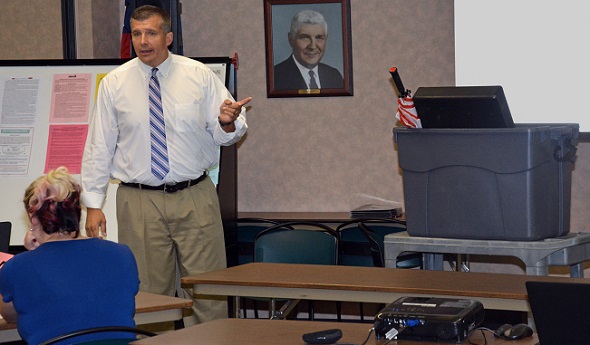
MHSAA's Next Director Welcomes New ADs
July 26, 2018
By Geoff Kimmerly
Second Half editor
EAST LANSING – The first new administrators to take part in the MHSAA's New Athletic Director Orientation Program for 2018-19 on Thursday received what's become an annual greeting by Executive Director John E. "Jack" Roberts – who then handed off for an introduction by Assistant Director Mark Uyl, who will take over for Roberts next month.
The AD orientation program is required for first-year athletic directors and athletic directors at new MHSAA member high schools, and more than 30 were in attendance for this first of three sessions at the MHSAA Office in East Lansing. MHSAA staff will provide this training, primarily on rules and regulations, to an expected 150 new athletic directors this fall, with sessions also Aug. 7 and then Sept. 11 for late hires.
Uyl has served as an Assistant Director at the MHSAA for nearly 15 years and previously was athletic director at Caledonia and Middleville Thornapple-Kellogg high schools. Roberts is retiring in August after serving as Executive Director for 32 years.
PHOTO: MHSAA Assistant Director Mark Uyl points out some of the tools new athletic directors will keep close at hand as they begin their work this school year.

Changes Create Calendar Conundrum
April 2, 2015
By Jack Roberts
MHSAA Executive Director
Decades ago, schools developed policies and procedures for competitive athletics that educators knew were best for both schools and students.
Schools believed that for every sport a period of guided practices to prepare students for competition was important to minimize risks and maximize performance. Maximum numbers of competitions per day and per week reinforced these beliefs and tended to assure students also had time for their studies.
Schools believed that the season should not run on forever, and maximums were established on the total number of weeks and competitions.
Schools believed that at least a short break between sports was good for both the bodies and minds of students, and that an extended break in the summer was also good, providing opportunities to engage in other sports, or for summer employment, or for family time and travel.
On every count, schools were correct.
Unfortunately, over time, sports programs of non-school groups have moved into every month, week, day or half-day that schools have not programmed for students. Most of it is competition without preparation (lots of games, few practices). And parents far too often have been far too willing to pay any amount and drive any distance to facilitate their child’s interest or force their child’s play.
What do educators do when what their heads tell them is the best no longer resonates in the hearts of so many people their schools are to serve?
And that question is at the heart of this week's MHSAA benchmarks series examining out-of-season issues. Watch for more installments over the next four days.

